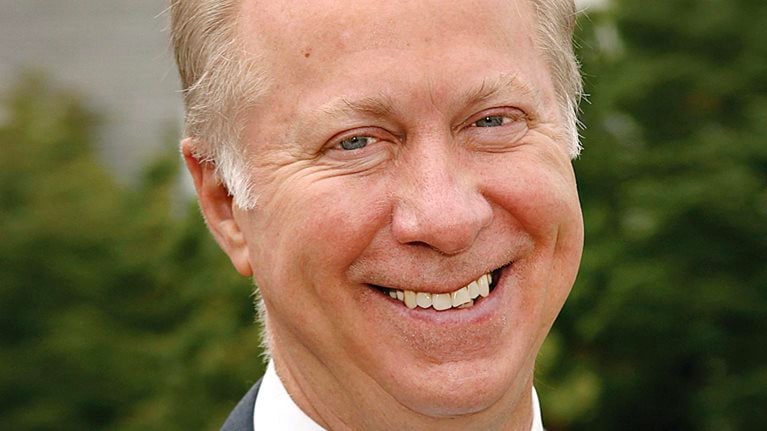In this edition of Author Talks, McKinsey Global Publishing’s Raju Narisetti chats with Alan Murray, Fortune Media CEO and lifelong journalist, about his new book, Tomorrow’s Capitalist: My Search for the Soul of Business (PublicAffairs, May 2022). Corporations used to avoid entering the conversation on controversial topics that didn’t affect their bottom line, but Murray says CEOs have reversed course. Now, companies are coupling profits and social purpose by aligning with the values that are most important to their consumers, employees, and other stakeholders. An edited version of the conversation follows.
Why did you write this book?
I'm the CEO of Fortune Media. In that position I have the opportunity to talk to a lot of CEOs. I began to hear a different story from them over the course of the last decade and decided to write a book about it. It's called Tomorrow's Capitalist. The change that I started noticing over the course of the last decade was in the way that business leaders were talking about their companies and how they led their companies—and it was pretty dramatic.
I've had a unique opportunity to have these conversations for almost four decades now. Starting about a decade ago, I started to hear a different emphasis about the social impact of business. Bill Gates gave a famous speech at Davos in 2008 where he talked about how we need a “more creative capitalism.” Then, John Mackey, CEO of Whole Foods, started talking about conscious capitalism; Marc Benioff, CEO of Salesforce.com, talked about compassionate capitalism; Michael Porter at Harvard Business School started talking about shared-value capitalism; and Lynn de Rothschild started speaking on inclusive capitalism.
All of a sudden, everybody was putting a modifier in front of ‘capitalism.’ There was a broad sense that companies weren’t doing as much as they needed to, to ensure their positive impact on society. That’s what finally exploded a couple of years ago in this stakeholder capitalism movement.
All of a sudden, everybody was putting a modifier in front of "capitalism." There was a broad sense that companies weren't doing as much as they needed to, to ensure their positive impact on society. That's what finally exploded a couple of years ago in this stakeholder capitalism movement.
In the long term, what is the relationship between profits and social purpose?
I put a lot of emphasis on that phrase, "in the long term," because all of us know there are thousands of ways in the short term that you can enhance a company's profit at the expense of society, at the expense of employees, at the expense of the long-term survival of the company.
You can put bad products into the market whose bad effects might not be discernible for several years. You can try and dump waste into the environment and it might not be caught for a number of years. Anybody who's been inside a C-suite doesn't have any problem thinking about ways that there is conflict in the short-term, between social purpose and profit.
But I do think as companies focus more and more on wanting to be around for ten years or 20 years or 30 years or 100 years, those things start to disappear. You realize that you can't be a successful company if the planet is on fire. You can't be a successful company if social division is causing the political order to break down.
What's happened over the course of the last decade, in part because of the failure of governments, is that companies have said, " We’ve got to pay attention to these long-term effects if we want to be around." They've also been pushed to do that by their employees. That's probably something we should talk more about—it's a big part of the dynamic—but a number of things have come together to force companies to say, "We need to pay more attention to the positive impact on society because if we don't, we may have an existential problem down the road."
How can hiring practices affect social mobility?
I'm not sure the social value is shifting from machines to people, but I do think that CEOs are increasingly focused on that dynamic and feel a deep responsibility that they have to do something to try and change it.
What I've seen over the last few years is the people leading large companies saying, "Hey, we have a responsibility not only to take care of the people who work for us but to figure out how to get the social mobility escalator in society going again. Because, again, if we don't, society starts to break down. Inequality tears society apart and support for what we do as business breaks down."
So, an increasing number of large companies have looked at things like their hiring practices, saying, "How do we stop just hiring people out of the best schools because they have the right credential and start hiring people based on the skills they have? How do we rewrite our job postings so that we can bring people into the organization who might not have gotten there otherwise? How do we contribute not just to training our own people but to create training mechanisms that can help more people rise up from the disadvantage to good jobs?"
I'm not sure they have attacked the problem at the scale it needs to be attacked at, but there is certainly much more attention to that in C-suites than there was ten years ago.
Are you seeing structural shifts in how business leaders handle non-core business issues and topics?
This is probably the most fascinating aspect of this change in business leadership. There is no question in my mind, as a journalist who was always trying to get CEOs to talk about controversial issues.
Ten years ago, 15 years ago, if you went to any CEO with a controversial topic like transgender bathrooms in North Carolina or voting rights—anything that didn't directly affect their bottom line—they would hide under the desk. They were not going to talk about social or controversial political issues that didn't directly affect their company. I would say that started to change maybe six or seven years ago. Marc Benioff of Salesforce was one of the leaders in this movement when he spoke out against the religious liberties law in the state of Indiana that was seen as being discriminatory towards gays and transgender people.
You've seen an explosion of this trend. In some ways the most striking example is the one that just happened. Putin invades Ukraine and within 15 days, you had 300 companies who had come out and said, "We're not going to do business anymore." In some cases it was because of sanctions, like the oil companies, but in many cases, it was a declaration of their values as a company. That had never happened before. The closest thing to that that I could find in the past was what was done against South Africa because of the apartheid regime—and that was a slow boil over the course of ten or 15 years, driven by shareholder activists.
This happened in 15 days. It was an extraordinary example of this notion that companies feel they have to have values in order to please their employees—more than anyone—but also investors and consumers, and they have to act on those values. You raise a really interesting point which is: What do you do when your statement of values gets you in the middle of a political battle? And that's still the instinct of a lot of CEOs.
I think what CEOs are learning is that the option of just saying nothing is going away. And sometimes it's pretty complicated to say, "Hey, this is a value we stand for, but we don't want to be in a political fight." Because this is all so new—it really has just happened in the last six or seven years—a lot of companies are still trying to figure out how to make their way through that thicket of issues.
What role should a government’s position play in influencing CEOs?
This is one more thing that is forcing the increasing decoupling between companies around China and Russia, and companies in the West. The stakeholder movement that I'm writing about here actually was stronger in Europe before it came to the U.S.
Klaus Schwab at the World Economic Forum will tell you he invented it 45 years ago. He considers himself the father of stakeholder capitalism. It just took a while for the rest of the world, particularly the U.S. CEOs, to catch on. It's very strong in Europe, it’s very strong in the U.S, but it’s very different in China. Obviously, stakeholder capitalism in China means one thing: there is one stakeholder, and it’s the Chinese government.
I think that's going to cause some real tension. I think this rise of stakeholder capitalism is going to create a real problem at some point, because how do you reconcile how you're operating in the West with how you're operating in the East?
Should CEOs be speaking up in favor of globalization?
That question about globalization is one of the most interesting questions about the future of business. If you look at the last quarter of the 20th century, this is where a lot of these companies gained their success and their heft, and their profits—from pursuing an active policy of globalization.
Now we've had about a decade of retreat. I think the war in Ukraine only adds to that, and the issues I'm talking about only add to that. So, there is a question around, “can these companies stand for globalization and at the same time support their own values?” I think that's going to be one of the big tensions of the future.
There are a lot of economic forces that argue in favor of continued globalization because they claim it's more efficient or claim you're dealing in a world of intellectual property where things flow very freely across borders anyway, even if you don't want them to. A bipolar world, a new Cold War based in economics, is going to be a very difficult thing to maintain—but not an impossible thing to maintain.
What role do you see for transparent, common metrics?
If you look at the history of business over the last two centuries you would have to say that the creation of strong financial metrics and financial accounting, and all the infrastructure that goes around that, has given the world much more confidence in financial metrics.
It's a very different world than it was at the end of the 19th century in terms of reliability of the measurements that come out of companies. So, I think strong financial metrics have made a difference. The problem now is we're moving into all these new areas. A great recent example is this 500-page document on environmental disclosure by the SEC: right now it's the Wild West.
Companies can pretty much claim whatever they want to claim around their sustainability practices and goals. We need to develop the same kind of superstructure around those goals that we currently have around financial goals. So, I think there's a lot of work to be done on metrics and accountability and transparency so that investors, consumers, and employees can hold companies accountable to commitments they're making around ESG.
Are you seeing more than just the “the pretense of purpose” among more CEOs?
I don't think this is a choice by companies. I think it's something that's being forced on them by their employees, by their customers, and, increasingly, the most interesting development over the last couple of years has been the pressure coming from investors.
You now have a sizeable minority—from measurements I've seen, over 40% of invested assets are invested with some sort of an ESG screen. It may not be a good ESG screen, but at least it's telling you that the investors care about these things. I was having a conversation last week with the CEO of one of the Big 4 accounting firms.
He says they're quickly reaching the point where they face more questions about the non-financial stuff than they do about the financial stuff. The most interesting angle is he said even in their tax work, it used to be just a question of, "What are we allowed to do?" In the last couple of years, more companies have been saying, "What's the moral thing to do? What's the right thing to do? What should we do?" Not just, "What does the law allow us to do?" So, I think these pressures are not going to be reversed, and companies are going to have to figure out how to deal with them.
In the last couple of years, more companies have been saying, ‘What’s the moral thing to do? What’s the right thing to do? What should we do?’ Not just, ‘What does the law allow us to do?’
You see examples of this all over the place. We live in a world that is demanding more of companies.
Can we accelerate the journey toward sustainable, inclusive growth for companies, employees, and our planet?
I'm glad you started with sustainability because I think that's probably the most interesting example to watch. You're getting close to half of the large companies—whether you look at the Fortune 500 or the S&P 500—you're getting close to half of them that have made commitments to some sort of net zero: reaching net zero by 2050 or earlier.
And so the question to watch over the next couple of decades is: were those commitments real, or did they back off of them? It's not going to be easy to get there. If you start to see the structures and systems in place to hold companies accountable for those commitments, then you'll know it's real. If you don't see it, then we'll know in a few years that they're moving in the wrong direction. I'm skeptical because I'm a journalist at heart. But I'm convinced that something very real is going on.
One of the things that makes it real is that when a Microsoft or a Walmart says, "We're only going to purchase from suppliers who meet these standards," then you start to have a snowballing effect, like, "Wow, I can't sell to Walmart unless I have a 2050 plan that is defensible, and surrounded by metrics, and accountable?" That affects a lot of businesses. You start to see the pressure snowball, and you begin to see real change happen.
In writing this book, what surprised you the most about a group (CEOs) that you know very well?
I started gathering information for the book before the pandemic hit. In March of 2020, when the pandemic did hit and companies realized that the economy was going to take a sharp move downwards, my first instinct was to say, "Oh, all this stakeholder capitalism stuff is going to go out the window," because people are going to be afraid of the bottom line and the effects on the bottom line, and they're going to focus on that and say, "We'll deal with stakeholders tomorrow."
Part of the reason I felt that way was because that's kind of what happened to the environmental movement at the last recession, the Great Recession in 2007, 2008. If you remember, there was a burgeoning of environmental consciousness among companies. Then the recession came, and they all disappeared. I thought the same thing was going to happen again. What stunned me was the exact opposite happened: the pandemic in a way was a stakeholder crisis, so instead of moving away from stakeholder goals, companies moved closer to stakeholder goals.
The employee certainly rose in importance in many company calculations. They said, "We have to make sure our people are safe, and our customers are safe." That was probably the moment where I said, "Wow, this is real. This is not ephemeral. This is not a fad. This is a dynamic driven by fundamental business forces and it's not going to go away." It may not solve our problems as quickly as we need it to, but it's not going away.
Watch the full interview


